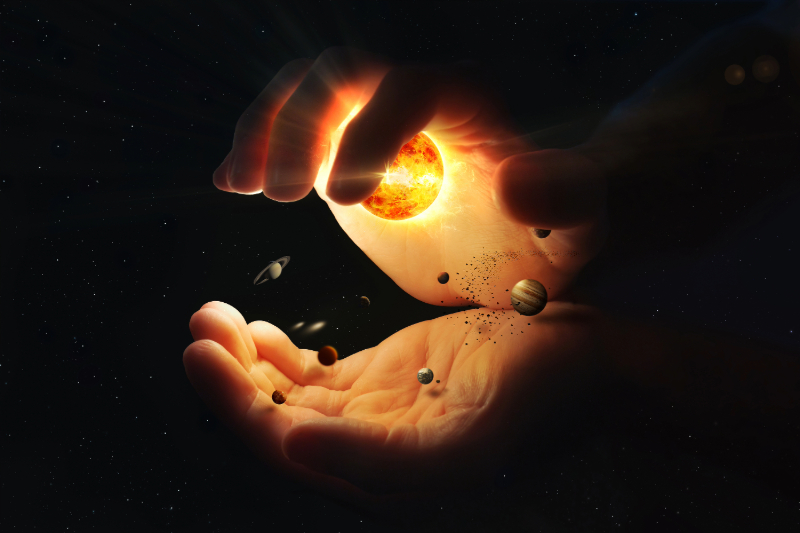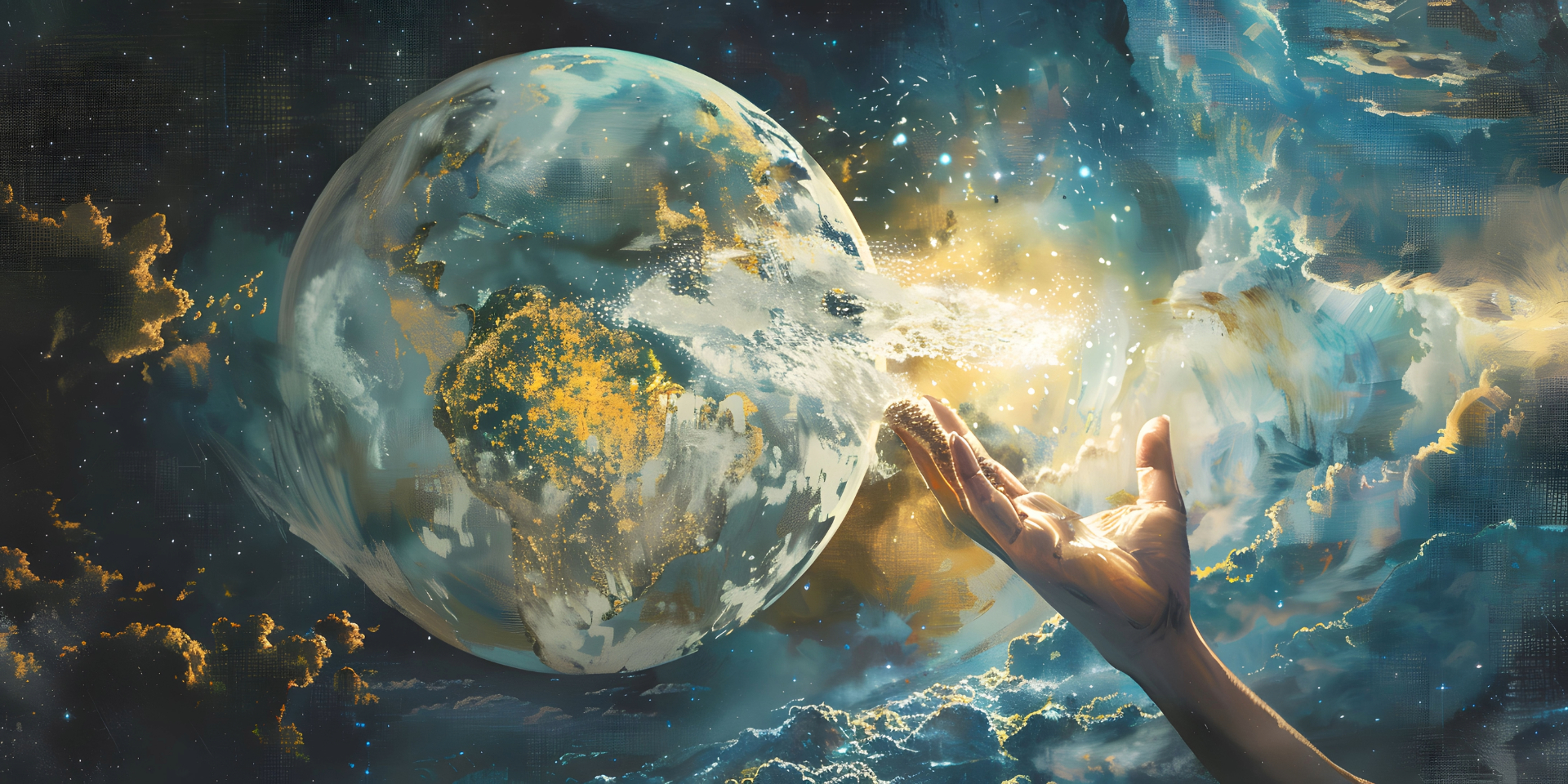The red horizons are shattered. But much more subtle dangers loom for the present and the future. In most Christian countries, theology has declared a truce with evolutionary atheology and has devised a foolish and deadly compromise that is neither atheism nor true Christianity.
It is called theistic evolutionism, evolutionary creationism or Christian Darwinism. This new creationist doctrine is the belief that God created the universe, life, and mankind according to the hidden laws assumed by naturalism. Believers must seriously ask themselves: Where does Satan fit into this evolutionary chain? What about Jesus Christ? And what are we evolving towards?
This is the most critical phase of the ideological conflict in education—an insidious challenge that has already conquered many churches. Secularism is triumphant, and Christianity is retreating into the murky realms of psychology and the even murkier realms of politics. Churches and believers have not given sufficient weight to this challenge.
Despite the claims of some that evolutionism is on the wane, that Darwin himself abandoned his theory on his deathbed, and that scientists are becoming increasingly religious, the truth is that evolutionism is making progress. Evolutionism has long since established itself in the scientific community and has become a respectable theory in society, a philosophy that has earned the title of science, based on the considerable observations of the natural sciences.
The socio-political tensions generated by the debate on the equal place of ideologies that explain the world (with more or less academic rhetoric) in the school curriculum are highly relevant. On the one hand, the majority of naturalist-trained specialists in the field do not want to legitimise creationism as an alternative in education. They do not accept any variant of creationism, no matter how “scientific” or diluted with evolutionism. On the other hand, in some countries, under pressure from religious forces, laws have been passed forcing schools to introduce alternative explanations so that students know that the study of origins is not a problem that science has solved. But these cultural-political experiments are short-lived, and the scientific community manages to regain its totalitarian prestige by raising two objections in particular to any form of scientific creationism: a) creationism is not science but religion in disguise; b) the synagogue and the churches (Catholic, Orthodox, Protestant), which were once purely creationist, now admit that evolutionism must be respected as a scientific truth and that there are models in theology for harmonising with the Bible. By implication, the place for creationism would appear to be where religious mythology is promoted in a fundamentalist, literalist style, rather than in the real world.

Creationism at a disadvantage
“Scientific creationism” is at a disadvantage today for obvious reasons. Evolutionism has gained seniority, scientific status, popularity, power and an army of activists and converts, from biologists, geologists, and physicists to journalists, artists, and theologians. Evolution has strong legal and material support from the world’s states.
Creationism as a scientific cause is much younger. Its arguments in favour of an intelligent creation and universal cataclysm, as told in the Bible, are edifying. However, creationism stands little chance against the spirits of misinformation and prejudice when it comes to the message of the Bible, even if those spirits are scientific geniuses.
There has been ridiculously little investment in research that would expose the cracks in evolutionism and bring to light data and evidence that might point in a better direction. It is not surprising that states, the media and various cultural forums are generally disinterested in this issue, but even large religious organisations (church, synagogue, etc.), which in many countries have their own universities, do not seem to be interested in investing in an unconventional and politically incorrect scientific venture. This explains why the number of truly religious scientists today is extremely small compared to previous centuries. And most of them, of course, create psychological pressure. In scientific institutions, it is practically impossible to propose or publish anything that would favour creationism, even if academic freedom is affirmed in theory. Every field of science has its established masters, and apprentices must learn the habits of their masters or they will not be tolerated.
Science is the sacred cow of modern humanity, which is why there is a tendency to look with reverence even at what it leaves behind. The very words “savant” and “science” inspire awe in the layman. It is a well-deserved prestige, to a certain extent, but it is exaggerated and at too great a cost.
Alternative research
No scientist can be free of philosophical assumptions or prejudices against another cosmogonic model simply because he is an expert in the field. This is a universal reality and applies to religion, science and many other fields. My premise is that truth has aesthetic criteria in its essence, and that fundamental truths must harmonise with the highest ideals of goodness and beauty. An aesthetically (morally) repugnant explanation cannot be the absolute truth about the generative and shaping principle of the universe. This is what I believe.
Biblical revelation is the only source in which the scenario of the origin of the world emphasises the combination of utility with the good and the beautiful. The biblical account uses the phenomenological and cultural language of physical appearances and the cosmological model that existed at the time it was written. But through this imperfect human language, addressed to children, ordinary people, and poets alike, the Bible conveys an authentic and true message that is applicable to practical life.
Beyond the phenomenological and cultural language of the Word, some theological and scientific puzzles remain (e.g: Does Genesis describe the beginning of the whole universe or just the beginning of our world as a planet capable of supporting life? If the stars were created out of nothing on the fourth day of the creation of our world, at today’s astronomical distances, how could they have been visible since that night?) Nevertheless, the practical and ethical-religious essence remains: The eternal God created the world in six days for no other reason than to give human beings a model, a plan of life in which work and rest, research and revelation meet and give meaning to each other.
At the end of each day’s work, the Creator rejoices in the results, as He “sees” that they are “good”. The Creator’s expression, the verb ra’a (to see) combined with the adjective tov (good), indicates in ancient Hebrew the idea of beauty, of “pleasing to the eye” (cf. Genesis 1:10, 12, 18, 21, 25; 3:6; 49:15; Exodus 2:2; Numbers 24:1). Everything God created was originally beautiful. And after so many millennia of degeneration and savagery, nature is still beautiful. At the end of Creation Week, the Creator rejoices in all things as “unimaginably beautiful”.
From the beginning, God gave nature to human beings not only as an environment, but also as a holy book, a true Bible, in which He reveals Himself. Ever since, it has been the sacred duty of mankind to study it. But just as many scholars today read the Bible in a spirit of scientific scepticism, so too nature is read in an atheistic, or at best agnostic, spirit. Under such conditions, it is not surprising that contradictions and questionable harmonisations arise between the interpretation of the Bible and the interpretation of nature, between theology and science. A natural and healthy tension between the two would be preferable to forced harmonisation. This is a challenge for both sides.

God’s wisdom in creation
There are amazing lessons about God in nature. Arno Penzias, a Nobel Prize-winning physicist (1978), says: “Astronomy leads us to a unique event, a universe which was created out of nothing, one with the very delicate balance needed to provide exactly the conditions required to permit life, and one which has an underlying (one might say ‘supernatural’) plan. Thus, the observations of modern science seem to lead to the same conclusions as centuries-old intuition.”[1]
Indeed, the fact that the Earth has a certain size and position in the solar system, that the Moon has exactly the dimensions and distance from the Earth necessary to stabilise the Earth’s rotation through its gravity, that the Sun has exactly the mass, composition and dimensions that make life on Earth possible, that we are in a certain place in the galaxy and not another, that the Earth’s atmosphere has a certain composition and not another, and that it is a clear atmosphere, all these factors and many others are responsible not only for the possibility of life on Earth, but also for the possibility of Earthlings to explore the Universe.
All such observations, in normal logic, betray the existence of an infinite intelligence that has put a purpose to everything. Naturalists regard them as mere coincidences, the result of blind forces of statistical laws. But these laws have their limits and cannot explain meaningful evolution or leaps to higher levels. There are limits to variation that do not allow for a generalised evolutionary explanation. If so many species are adapted to environmental conditions, some have no visual organs (e.g. many species of worms), others reproduce asexually (many plants, protozoa, hydras, even some insects), what pressing need could have created the eye or sexual differentiation?
Paul Lüth noted in The Day of Creation and the Man of the Future (a book published in communist Romania, no less!) that there are so many phenomena that cannot be explained by the past of the species, such as, for example, the fact that only in humans does the newborn tear off parts of the mother’s tissue along with the egg membranes… This peculiarity does not exist in animals. Animals give birth without risk, even the great apes. What is the meaning of this natural innovation? We do not know.[2] On the side of the quotation I had noted, three decades ago, the reference to Genesis 3:16-17 (“I will make your pains in childbearing very severe; with painful labour you will give birth to children”).
The insanity of Christian evolutionism
In the same period of atheist domination, the academic Stefan Milcu and his collaborators concluded in their book Man and Civilisation: “These discussions show us how great and numerous are the uncertainties of human evolution. This is why Leakey said (in 1965) that in a few years we will realise how little we know about the origin and evolution of mankind. Surely this remark is enough to make us look with great caution even at the certainties of the past.”[3]
Although there is little real science about these realities, there are many certainties. People generally don’t like to admit that they don’t know.
One of the great physicists, Robert Jastrow, wrote with some bitterness: “A sound explanation may exist for the explosive birth of our Universe; but if it does, science cannot find out what the explanation is. The scientist’s pursuit of the past ends in the moment of creation. This is an exceedingly strange, unexpected development by all but theologians. They have always accepted the word of the Bible… Now we would like to pursue that inquiry farther back in time, but the barrier to further progress seems insurmountable. It is not a matter of another year, another decade of work, another measurement, or another theory; at this moment it seems as though science will never be able to raise the curtain on the mystery of creation. For the scientist who has lived by his faith in the power of reason, the story ends like a bad dream. He has scaled the mountains of ignorance; he is about to conquer the highest peak; as he pulls himself over the final rock, he is greeted by a band of theologians who have been sitting there for centuries.”[4]

Such a commentary is encouraging to the believer. But the affirmation of faith in God by a learned naturalist is not necessarily a plea for the God of Genesis. Many are increasingly comfortable with the idea that evolutionism is God’s method of creation. Apart from the fact that such theories cannot fairly be reconciled with the Bible and offer no better explanation than pure naturalism, they are utterly unsightly and implausible, no less monstrous than atheistic evolutionism. These models imply the existence of death, of suffering and injustice, of evil, as if the Creator had included them in His methodology without any reasonable explanation. Thus an image is proposed of a monstrous God, indifferent to the sensibilities of His own creation. For the real evil, the Bible offers both reasonable explanations and the hope of salvation, but imaginary evolutionisms do not satisfactorily explain the meaning of evil and cast a dense shadow over the future.
Mythologising the creation chapter of Genesis not only abolishes the meaning of the week and the weekly Sabbath, which are exclusively religious in origin, but seriously and irretrievably undermines the credibility and authority of the Bible for all other references to supernatural acts. Having genetically altered Genesis, Revelation needs no additional catastrophe; the Gospel, with the birth, death, and resurrection of Jesus, is nothing more than a collection of pious legends, and salvation a vain hope for weak spirits!
Who is stronger?
It is well known that the existence of the universe depends on finely balanced physical constants: the gravitational constant, the balance of nuclear forces, the values of electromagnetism, etc. If just one of these constants were slightly off, the universe could not exist. Interestingly, however, while the strongest forces have been restrained by the Creator at the microcosmic level, in the atomic and subatomic world, gravity, the weakest force, has been destined to dominate the universe. For me, this is a parable of the superiority of good, of the principle of Christian love, of creationist truth; a promise of victory for those who seem weak in this world.
The following anecdote circulated during the communist years: In a university in Moscow, students were listening to a lecture on evolutionism. The professor argued that the fittest and the strongest individuals would survive and that the others were doomed to extinction. But the student Fyodor raised his hand and asked, “Comrade Professor, what about the sheep?” “What sheep?” the Professor enquired. “I was just thinking… before man became man and domesticated the sheep, how did the sheep survive in the midst of so many predators?”
Similarly, the Book of Revelation describes the great protagonists of the struggle between the two spiritual species in the universe as the Lamb and the Beast. Revelation states with certainty that the Lamb and those on His side will defeat the Beast and those on its side. The biblical faith of the religious individual, which may often seem childish and ridiculous, will in the end prove stronger than the science of the arrogant individual who believes he is the smartest person in the room. Even in religion, it is not theology that will have the last word, not even faith and hope, but love—the force that seems the weakest.
“But God chose the foolish things of the world to shame the wise; God chose the weak things of the world to shame the strong. God chose the lowly things of this world and the despised things—and the things that are not—to nullify the things that are” (1 Corinthians 1:27, 28). Therefore, creationism is destined to win, and in spite of the establishment of evolutionism in academies, schools and even in the Church, Biblical truth, which is so seriously challenged today, will prevail.




















